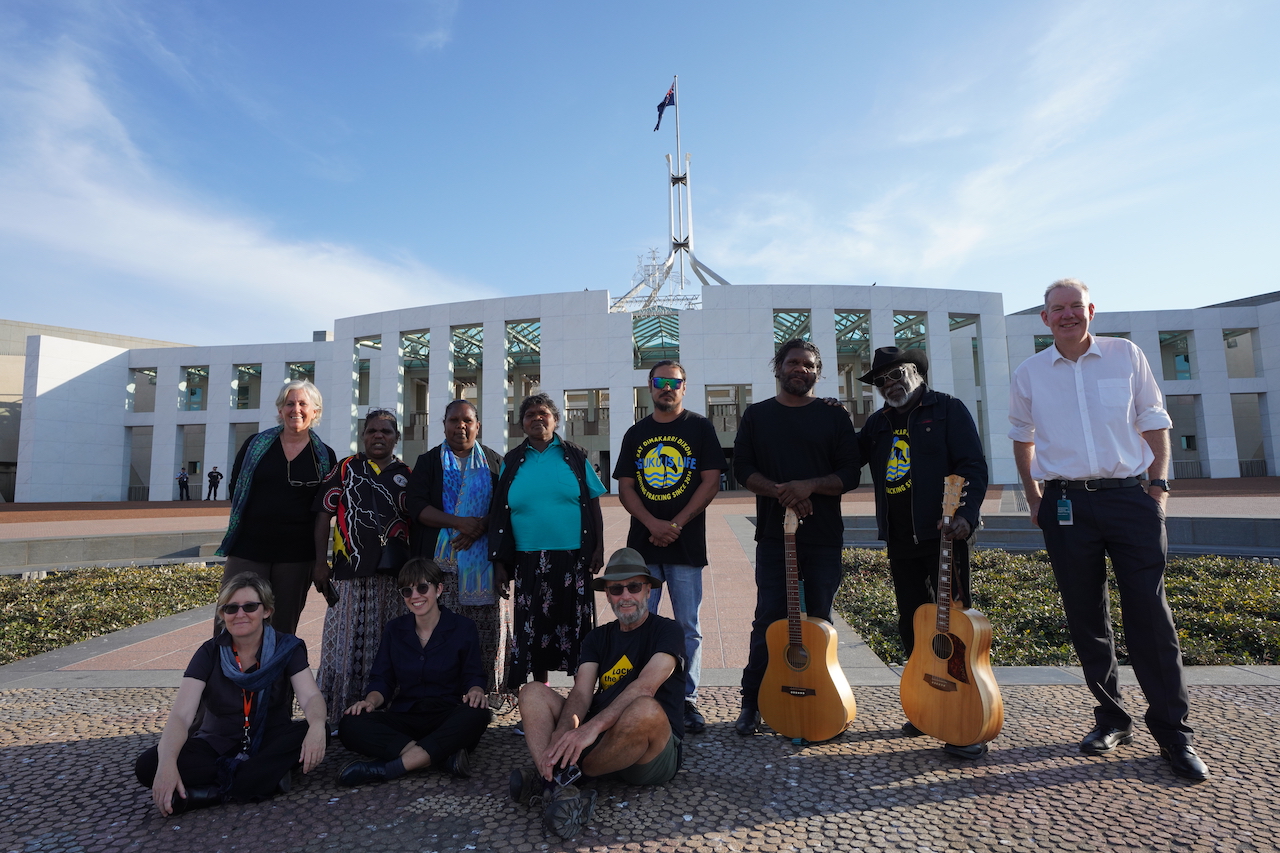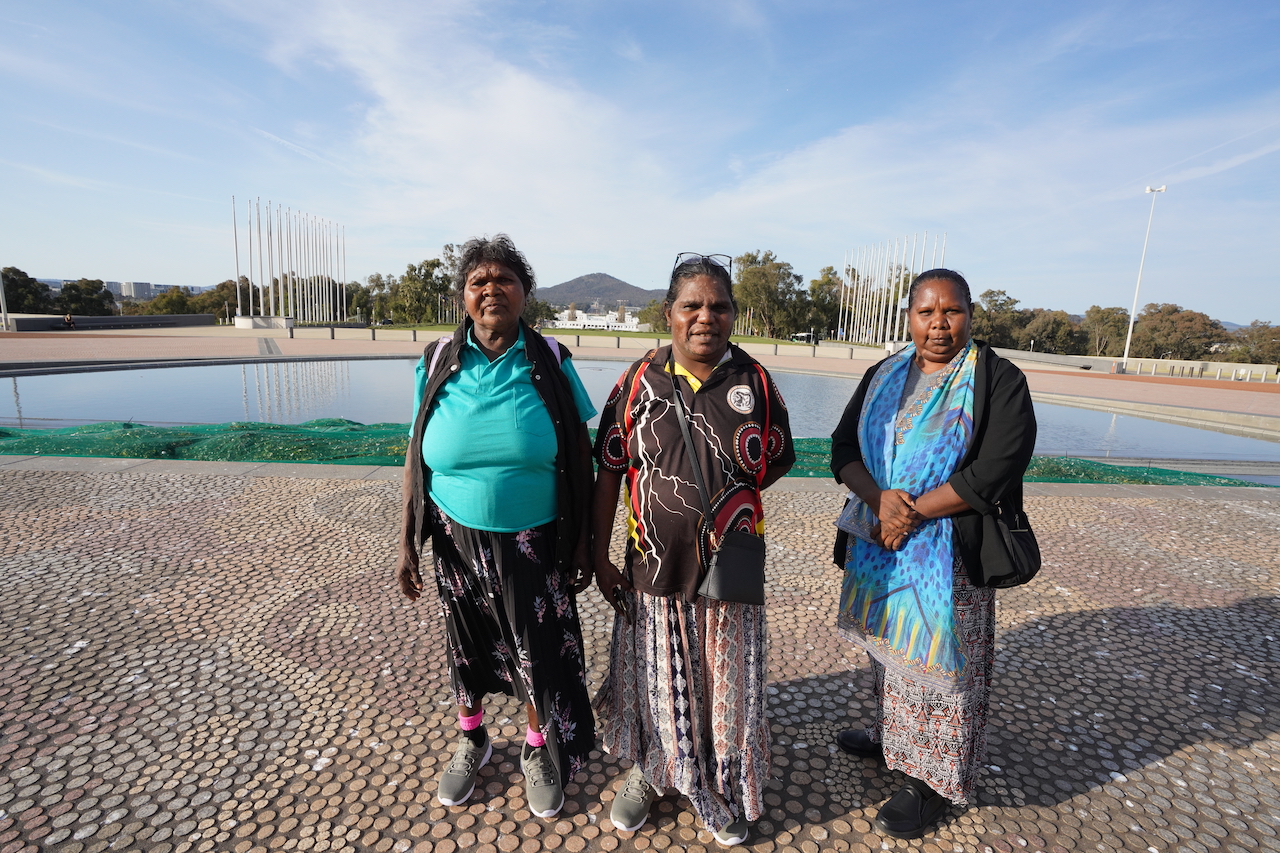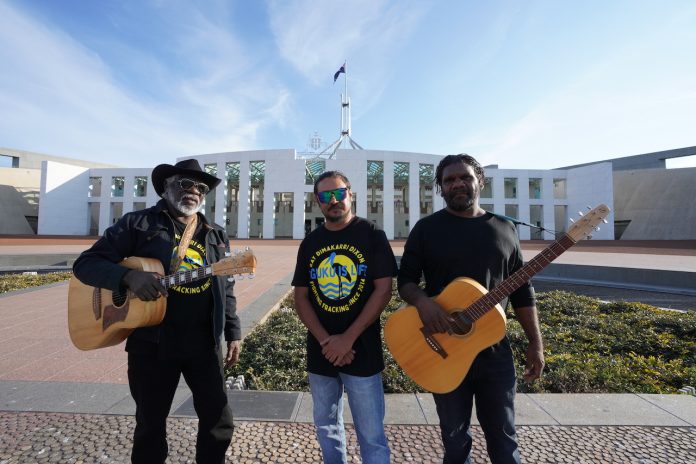Jingili singer-songwriter Stuart Nuggett and Mudburra traditional owner Ray Dimakarri Dixon, who is also a singer-songwriter, took their concerns about fracking Beetaloo Basin to Canberra in mid-September, where they performed for MPs and their staff at Parliament House.
The singers were joined in Canberra by other traditional owners from the Beetaloo Basin, Protect Big Rivers and Frack Free NT to call on the Federal Government to move before the end of the year to fulfil its commitment to expand the water trigger to all forms of unconventional gas.
They also want the government to amend guidelines for the water trigger to require the consideration of the cultural and spiritual value and significance of water resources to First Nations people.

To learn more about the anti-fracking campaign, see the Stop Fracking the NT Petition, addressed to Prime Minister Anthony Albanese, Environment Minister Tanya Plibersek, Climate Change Minister Chris Bowen and Minister for Infrastructure and Regional Development Catherine King.
The petition says:
The NT Government has failed us and given the greenlight to the fracking industry to push ahead towards production despite the extreme risks.
I’m calling on the Federal Government to use its powers to protect the Territory and rule out any public funding for fracking or associated infrastructure
Please take action to protect water, culture and climate and stop 6,000 frack wells being drilled across the Beetaloo.
More than 2,300 health professionals, including dozens of paediatricians, including dozens of paediatricians, have also signed a letter to the Prime Minister pleading for the Northern Territory government to withdraw support for a full-scale fracking industry, citing direct and indirect health risks.
Darwin paediatrician, Dr Louise Woodward, has been a prime mover in this campaign and led a grassroots delegation of almost 100 doctors and other healthcare providers to rally outside Parliament House on August 8.
Indigenous traditional owners and parents also joined the protest to demand the federal government stop fracking in the Beetaloo Basin and withdraw its $1.5 billion subsidy for the Middle Arm project on Darwin Harbour.
Dr Woodward drew together the concerned healthcare professionals after the Northern Territory Government refused to meet with her and 40 other local paediatricians to discuss their concerns about the health risks of Middle Arm and the associated fracking of the Beetaloo Basin.
Peak medical bodies have supported the movement, including the Australian Medical Association ACT, the Royal Australasian College of Physicians, and the Australian College of Emergency Medicine.
On August 31, Dr Woodward, said, “Fracking the Beetaloo Basin will increase Australia’s emissions by 20 per cent, just this single project, putting all of our health at risk in terms of the climate crisis – but also putting the local people of the Northern Territory at risk due to direct health impacts of fracking.
“Up here in the Northern Territory we need the help of everyone in Australia – to come together and tell the Federal Government that this is not okay. We need to deal with the climate crisis urgently, and we need to stop the Middle Arm project and Beetaloo fracking if we are to have any hope of addressing climate change – and if we are to protect the people of the Northern Territory from the known health impacts of these dangerous projects.”
Earlier this year, the Northern Territory government gave the green light for gas production to begin in the basin.
Companies will still need to make financial decisions about whether to proceed and apply for required environmental approvals. But if the Beetaloo did reach full production it could see thousands of wells across the landscape.

“We need to watch over our young [people’s] future. Our country is crying out for our water,” says Jocelyn James, a Mangarrayi and Yangman elder and traditional owner for Jilkminggan.
Speaking in Question Time on August 8, Mr Albanese defended his government’s involvement in the Middle Arm project saying only one of the projects was potentially associated with fossil fuels and therefore “five of the six proponents are hydrogen, critical minerals, green ammonia and solar companies”.





